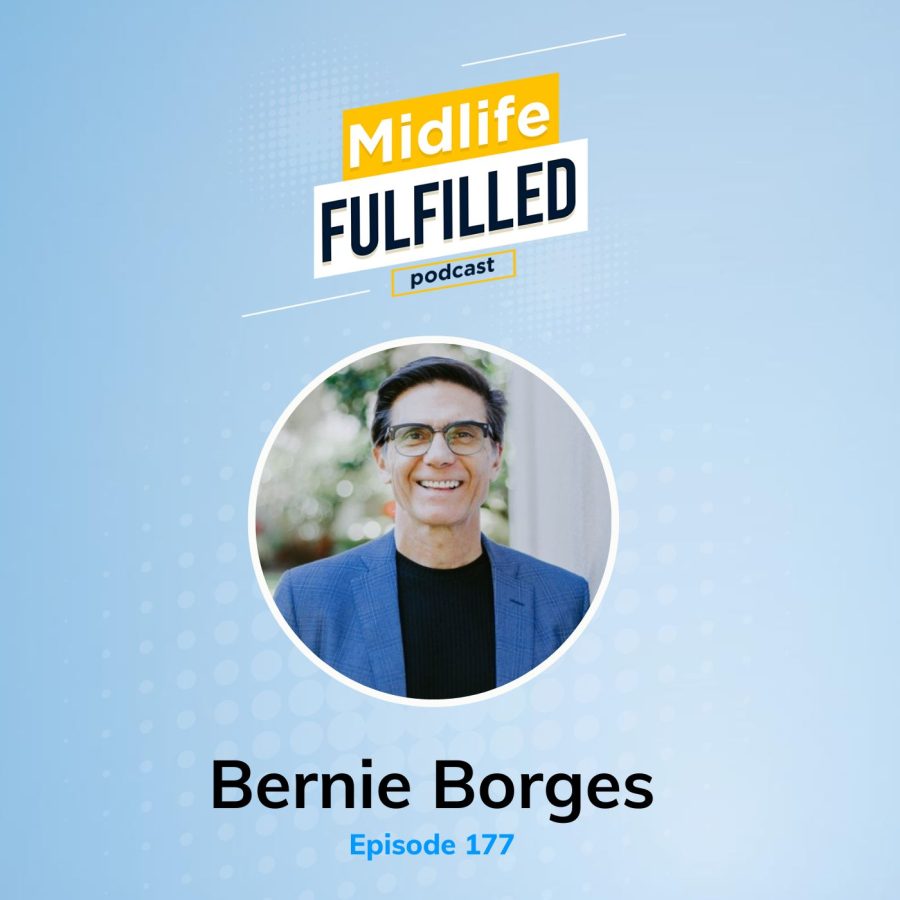Bernie Borges [00:00:00]:
Hello, my midlife friend. This is Bernie Borges, your host of the Midlife Fulfill podcast. And this is episode 177, a takeaway episode from episode 176, my conversation with Vicki Dixon. On takeaway episodes, you know the drill. I summarize key discussion points from the previous episode, and then I hone in on one key takeaway that I want to emphasize to you. And then I issue you a challenge to consider on this topic. 1st, let me begin by reintroducing you to Vicki. Vicki is a lifelong entrepreneur and a certified holistic nutritionist who specializes in using human design as a tool to guide intentionality in this journey that we call life.
Bernie Borges [00:00:49]:
Her journey has been anything but a straight line, like so many of us. Vicky once operated a brick and mortar business. In fact, she did that for 13 years. She closed the store, and then she went back to college to study and get certified in holistic nutrition. And then she became a yoga teacher with an emphasis on senior caregivers, and she pursued reiki training. At this point in Vicky’s life, she admits that she felt that she had lost herself. Her nest was empty, but not as empty as the gaping hole where her heart used to live. She says that she had forgotten who she was without the basketball games, the weekend tournaments, and the house full of teenagers.
Bernie Borges [00:01:31]:
How many of us can relate to that? With her head spinning about her identity as a wife and a mom and an entrepreneur, in this period of her life, she dove head first into a direct sales position. And within 14 months, she had reached the top 7% of the company, and she had a 6 figure income to boot. In 2021, Vicki discovered human design. She trained with 3 of the most renowned practitioners, and she opened her own human design practice in late 2022. Vicki says that her secret sauce is showing others how to bring their human design to life in their business so that they can have the impact that they wanna have. And I would add that Vicki has a holistic perspective that helps people understand how to thrive in their Midlife, including, but not limited to their business. So the 3 discussion points from our conversation on episode 176 are the following. Number 1, I asked Vicky to explain human design.
Bernie Borges [00:02:38]:
So point number 1 is understanding what it is. Vicky explained that human design is a snapshot of our moment of birth as well as 3 months before, showing how our energy is meant to work, as well as our strengths, our talents, and areas where we might face challenges in life. Human design is based on a mix of astrology, biochemistry, and the chakra system and also combines principles from the I Ching, Kabbalah, and Quantum Physics. Boy, that’s a lot to take in. Point number 2 is human design and relationships. We discussed how human design can be used to improve relationships by providing insights into individual designs that allow for better understanding and appreciation of each other. And point number 3 is harnessing vision and intuition. Vicki uncovered fascinating elements of my human design, explaining how it aligns with my visionary approach and intuitive understanding of people that provide meaningful insights into my leadership and communication style.
Bernie Borges [00:03:51]:
So my key takeaway from this episode with Vicki Dixon is, well, actually, before I explain my takeaway, I wanna share the following. Hey. I’m new to human design, Brand new. And I’m still learning about it. I’m very intrigued by it because it offers compelling insights into who we are. Now I also want to admit that I was conflicted going into this conversation with Vicky because of my bible based faith. I believe that every human is uniquely designed by God. And I even shared this with Vicky, and I wondered if human design is in any way in conflict with the bible.
Bernie Borges [00:04:34]:
So I did some digging on this, and I found reactions that span many opinions on the compatibility or incompatibility between human design and the Bible. So let’s fast track this because where I arrived is that there is no inherent conflict between human design and the bible because they’re fundamentally different systems with different purposes. That’s the main point. See, the Bible is fundamentally about a relationship with God both here on this health and in eternity through Jesus Christ. Human design is about understanding your strengths and weaknesses while you’re here on Earth to live the best and most fulfilling life that you can live in relationship with others. Human Design doesn’t teach anything about the afterlife, which the Bible does. Human Design doesn’t profess to be a religion or a substitute for religion. And the Bible is considered to be the ordained word of God by those of us who believe that to be true.
Bernie Borges [00:05:48]:
So my takeaway is that I’m interested in understanding how human design can provide profound insights into our strengths, our challenges, our relationships, and can contribute to more fulfilling and purpose driven lives. I want to explore how I can harness my understanding of my Human Design Chart to live my best life across the 5 pillars, health, fitness, career, relationships, and legacy? And how does Human Design provide a broader understanding of each of these pillars? And I wanna do all this while living this life within my Bible based faith. So, this is a big question, and I can’t possibly do it justice in a 15 or 20 minute podcast episode, but, hey, let’s give this a shot. You see, in human design speak, I am a projector. And, supposedly, projectors make up about 20% of the world’s population. As a projector, I have a unique set of characteristics and a specific strategy for navigating life. Now, here are some of the key traits of projectors and then followed by my commentary on each trait. The first one is known as energy and aura.
Bernie Borges [00:07:12]:
It says that projectors have an aura that can be described as closed or repelling energy. This means that my aura doesn’t automatically pull others in or initiate interactions. I don’t like this trait, and I sincerely hope that it’s only true in a few situations. I really hope. Also, projectors have a focused, intense energy that can be overwhelming for others if it’s not properly managed. Wow. This is very true for me. You see, when I was in my twenties, my work buddies at the time nicknamed me, are you ready for this? Stuffed shirt.
Bernie Borges [00:07:56]:
Yeah. They call me stuffed shirt because of my intensity at work. They frequently said things like, lighten up, Bernie. It’s just a job. This experience made me aware of my intensity, and I wanna believe that I’ve toned down my intensity over the years, especially after becoming aware of it at such an early age in my career. Another trait is decision making. Projectors are designed to wait for an invitation or recognition from others before offering their wisdom or taking action. Now this used to be more true of me in the past.
Bernie Borges [00:08:30]:
In recent years, I am much more willing to jump in with my ideas and my quote unquote wisdom. Also, projectors are meant to guide and manage others’ energy rather than working alone or being self motivated. That is totally me. Projectors should wait to be truly seen and valued before sharing their insights and gifts. As I mentioned a moment ago, that’s not as true now than it was in years past, especially since I’ve been in various leadership roles throughout my career. Some of the strengths of a projector are projectors have a keen sense of observation and can provide valuable guidance when recognized. I pride myself on my sense of observation. I can see things that others often don’t see.
Bernie Borges [00:09:20]:
In fact, Vicki mentioned that during our conversation. Projectors are excellent advisors, counselors, and managers when their energy is invited. Yes. I love to give advice, but I’m careful to explain my advice with context and also with respect for others’ perspectives and their own point of view. Projectors have a clear objective perspective and can see the bigger picture. Yes. Absolutely. This is totally me.
Bernie Borges [00:09:51]:
This is why I can see things that sometimes others can’t see. Now, some challenges for projectors. Projectors can feel frustrated or bitter if their gifts aren’t recognized or invited. Now, I didn’t even notice this in my twenties and part of my thirties. I began to realize this in leadership roles, especially when my leadership impact is more behind the scenes. You see, front facing impact is easy to recognize, but my frustration has come when I know my role behind the scenes influenced a good outcome, but I didn’t get recognized for it because it was behind the scenes. Has that ever happened to you? Projectors may struggle with self motivation and can become stuck in inaction if they’re not guided properly. Now this was somewhat true of me in my twenties a little into my thirties, but since my forties, I haven’t lacked self motivation and I have not struggled with inaction.
Bernie Borges [00:10:55]:
Projectors can become overly opinionated or preachy if they don’t wait for an invitation. I suppose there are examples of this that others might corroborate, but I hope that this is the exception and not the norm. I certainly don’t want to come across as overly opinionated or preachy in any situation. Let’s look at strategy for projectors. The key strategy for projectors is to wait for an invitation or recognition before offering their energy and wisdom. Now, as I mentioned earlier, this was truer of me in decades past, but not since my forties. When I have energy or wisdom that I wanna offer, I generally jump in with both feet. And that wasn’t always true, but it’s definitely true the past 25 or so years.
Bernie Borges [00:11:46]:
Projectors should conserve their energy and only share it with those who truly value and appreciate their insights. This is an interesting one. And, now that I think about this, I am selective about where and with whom I share my insights. If I think sharing my insights is gonna be a waste of my time, I won’t bother. Projectors thrive when they are seen, valued, and their guidance is sought after. This is definitely true for me. You see, I began public speaking in my late twenties. I’ve always enjoyed being recognized for sharing a message from a stage or a platform.
Bernie Borges [00:12:33]:
I feel valued when I have the opportunity to deliver a message that has meaning to a willing audience willing to listen. Hello. This is what I’m doing with the Midlife Fulfill podcast, albeit from a different kind of stage. One with a microphone that has potential to be listened to anywhere through the power of the distribution that podcasts have through the Internet. You see my friend, I feel valued when I get feedback on the meaning of the content from this podcast. So let me share another quote from Human Design. As a projector, it’s important to understand your unique energy dynamics and follow the strategy of waiting for an invitation. This allows you to share your gifts with the world in a sustainable and impactful way.
Bernie Borges [00:13:32]:
So, this is where I’m gonna come back and integrate my bible based faith with Human Design. Now, just hear me out on this. Okay? Because on this point of waiting for an invitation, I firmly believe that that’s a calling from God. And when I say calling, all I mean is that when there’s an opportunity that’s made available to me to share my energy, or my wisdom, or my guidance, or my leadership, that’s a calling from God. I mean, let’s not over complicate it. And I don’t view the word invitation as being limited to someone inviting me to offer my energy or wisdom or guidance or leadership. To me, an invitation is when I recognize that I’ve got something to share in a situation, and I choose to share it because a situation calls for it. This can be in a work setting, or family, or really any other setting.
Bernie Borges [00:14:24]:
So if I look at this from the perspective of scripture, from the bible, there’s a parable that’s very well known. It’s called the parable of the talents. It’s found in the gospel of Matthew, specifically Matthew 25 verses 14 through 30. I’m not gonna read it. It’s a story of a man, a land owner, who goes on a journey, and he entrusts his property to his servants according to their abilities. So one servant gets 5 talents, another servant gets 2 talents, and another one gets 1 talent, each according to his ability. And then upon return from his journey, he evaluates each servant based on how they used the talents that were entrusted to each of them. The key message to this parable is that each of us is given different gifts, and those are represented by the talents in this parable.
Bernie Borges [00:15:21]:
And it’s expected that we use these gifts wisely and to our full potential. In this parable, in the Bible, it ends with a strong admonition by the landowner for those who do not use their gifts responsibly. So my friend, this projector, me, I no longer wait for an invitation. If I see an opportunity to use my talents, provided the situation is realistic and it’s not over imposing to others, I wouldn’t intrude on someone else’s leadership and just take over. I might offer a leader advice privately if I think that my advice could be helpful, but my point is that I’m gonna use my talents whenever and wherever I can. I don’t wait for an invitation. So, if I come back to this principle of projectors thrive when they’re seen, valued, and their guidance is sought after, this is what I’m doing with the Midlife Fulfill podcast. I feel valued when I get feedback on the meaning of the content in this podcast.
Bernie Borges [00:16:38]:
So my friend, if you’ve made it this far in this episode, first, thank you. But I have a favor to ask of you. Please tell me something about the Midlife Fulfill podcast that impacts you, whether it’s positive, neutral, or negative. Please give me that feedback. As human design principles say, I thrive when I feel valued. And, if you have constructive feedback for me, I welcome it. Whatever it is, just scroll over to the show notes page for this episode, and you’ll find my email there. And if you want to send me a voice message, just go to the website, midlifefulfilled.com.
Bernie Borges [00:17:21]:
Visit the get in touch page, and one of the options is to leave me a voice message. It’s really simple. I would love to hear from you, and I will appreciate hearing from you, whether it’s literally hearing from you in voice or through an email. I really, really want your feedback. Hey. I wanna thank Vicky Dixon for joining me on episode 176 to provide this introduction to human design. And I hope that you’re intrigued to learn more as I am. And if you wanna learn your own human design chart, go to Vicky’s website that’s in the show notes, and you can do that.
Bernie Borges [00:18:01]:
In fact, that’s my challenge to you, my midlife friend. Check out your own human design. Just go to Vicki’s website and discover what human design says about you. Hey. I wanna remind you that you can watch my video recording with Vicki on episode 1 76 on my Midlife Fulfilled YouTube channel. That’s linked up in the show notes page. Hey. My next guest episode features Art Turok.
Bernie Borges [00:18:30]:
Art explains how he achieved elite performance in his life, which includes his career and also in Art’s case, also in athletics. You see, Art’s in his seventies, and he is an elite performer both in his career and in athletics. In fact, you’ll hear about his elite performance in 2015 and 2016 when he competed in a pentathlon and had scores that would knock your socks off. You’ll hear all about that in episode 178. If you’re a new listener, welcome. Hey. I hope that you’ll hit the subscribe button on your podcast player so that you don’t miss that episode as well as future episodes. You know what time it is, my midlife friend.
Bernie Borges [00:19:16]:
It’s that time when I remind you that if you’re 80% fulfilled, you’re doing great. And if you wanna know how I know this, I have a scorecard for that. Just download it. Hey, I’ll see you on episode 178. I’ll see you then.








